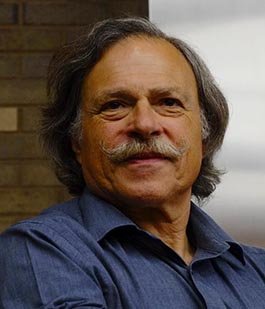Van Vleck Public Lecture: Towards Artificial Life with DNA Nanotechnology
Self-replication and evolution under selective pressure are inherent phenomena in life, but few artificial systems exhibit these phenomena. Professor Chaikin and his team have designed a process and a system of DNA origami tiles that exponentially replicate a seed pattern, doubling (or more) the copies in each diurnal-like cycle of temperature and UV illumination, producing more than 7 million copies in 24 cycles. They demonstrate environmental selection in growing populations by incorporating pH sensitive binding in two sub-populations. They also use DNA origami to self-assemble complex arrangements of microspheres and emulsion droplets with highly specific geometry showing control over valence, position, dihedral angles, chirality and to make DNA micro-machines.
About the Speaker:

Professor Paul Chaikin earned a physics B.S. from California Institute of Technology (1966) and a physics Ph.D. from the University of Pennsylvania (1971) with a thesis on Kondo superconductors. He joined the physics faculty at the University of California, Los Angeles in 1972 and studied thermopower, charge and spin density waves, and high magnetic field phenomena. The lure of actually seeing the microscopics of a system led him into soft matter, where he helped develop techniques to measure elasticity and motion, and to understand interparticle interactions. Both hard and soft matter interests continued after joining the faculty at the University of Pennsylvania (1983), the research staff at Exxon Research (1983) and the faculty at Princeton University (1988). His interests in geometry and topology led to founding contributions to nanolithography with diblock copolymers, and studies of defect motion and annealing. Probably his most well-known contribution is showing that ellipsoids (e.g., M&M’s) pack more densely than spheres and helping to explain why. In 2005, he helped found the Center for Soft Matter Research and joined the faculty at New York University (NYU). His more recent research centers on photonic non-crystals, artificial active matter, colloids, self-assembly, self-replication, DNA nanotechnology, topological defects on curved surfaces and quantifying order in nonequilibrium phenomena.
Registration (Deadline: Monday, April 1st)
Questions? Contact Gregory Bocko at gbocko@umn.edu
